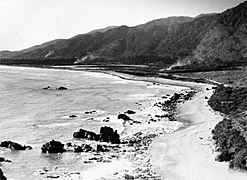GLAM/Newsletter/February 2022/Contents/New Zealand report
|
National Digital Forum and Editing in a Time of COVID
COVID-19 community transmission has finally begun in New Zealand, and we're currently navigating a surge of Omicron with for the first time thousands of cases a day. Until the middle of 2021 face-to-face meetups and conferences, without masks, were still happening regularly. But we're now encountering the same restrictions as the rest of the rest of the world.
National Digital Forum
The largest national meeting of representatives from GLAM organisations in New Zealand focuses on digital tools and projects, and runs at Te Papa in November every year. In the past NDF has hosted Wikipedia and Wikidata presentations and workshops, including a Whose Knowledge? keynote in 2019. The November 2021 conference was postponed to 22–23 February this year, and three weeks before it was due to start was moved online. An attempt was made to preserve some of the discussion and networking that would normally be thr highlight of NDF, but the presentation programme was moved essentially unchanged to a virtual platform, with many talks prerecorded and no real chance for questions or follow-up. Such is life in a new age, where expectations of a what a conference is lags behind the ways we suddenly now meet and talk.
Given the constraints, there was still some Wikimedia content at NDF. James Taylor of Auckland War Memorial Museum spoke about their WMF-funded project to incorporate Wikipedia into the new Aotearoa New Zealand History school curriculum. Harley Couper and Elisha Rolleston of Tauranga City Libraries presented their new community repository, Pae Korokī, which uses both Creative Commons licences and their own categories for the reuse of images with cultural/ethical significance to Māori, as well as recording tribal/ancestry affiliation of objects (see for example this painting). This was very exciting to most attendees: Māori cultural items in museums and archives often have restrictions on use, but there's been no labelling system to clearly set out what can and can't be done with different classes of image, so Tauranga City Libraries' initiative is a great first step. And in one of the last sessions I presented a lightning talk on Wikimedia and GLAM in New Zealand, an overview of some of the different collaborations and projects that have happened over the last few years.
Barrytown Wikiblitz
A Wikiblitz is a sort of focussed edit-a-thon centred on just one or two articles, pairing up subject experts with Wikipedians. As part of my job as a digital librarian at Westland District Library, we had planned a wikiblitz in the tiny West Coast settlement of Barrytown, to work on the article about the town and its nearby Westland petrel colony. The all-day event was to be held in the historic Barrytown Settler's Hall. In the end, everything had to be moved online, with a series of meetings in Whereby to coordinate volunteer editors around New Zealand. We were still able to work with the Barrytown community, who donated personal stories, news clippings, and old photographs for Commons. A new article about the Barrytown Flats was created, and others improved or had photographs added. The participants resolved to have a follow-up meeting to keep working with Barrytown locals in a month. The West Coast Technology Education Trust, using Lottery Grants Board funding, agreed to sponsor this event and cover the costs of a second one later in the year on endangered species of the West Coast.
-
Barrytown Flats 1930s
-
Barrytown Flats
-
Barrytown in early 1930s
-
Taxis outside All Nations Hotel, 1920s
- Albania report
- Australia report
- Belgium report
- Estonia report
- France report
- Italy report
- Kosovo report
- Netherlands report
- New Zealand report
- Nigeria report
- Poland report
- Serbia report
- Sweden report
- UK report
- Ukraine report
- USA report
- AvoinGLAM report
- Content Partnerships Hub report
- Structured Data on Wikimedia Commons report
- Calendar






